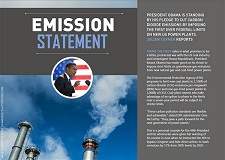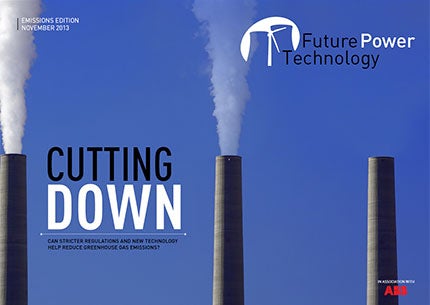
President Obama is standing by his pledge to cut CO2 emissions by imposing the first ever federal limits on new US power plants. We explore the political fallout from the Climate Action Plan and assess its impact on the US energy landscape.
In the latest issue of Future Power Technology, we take a look at the Regional Greenhouse Gas Initiative (RGGI) and ask if it could serve as a national model for reducing harmful emissions from power plants. We also take a look at the most cost-effective methods of reducing SOx and NOx emissions, including selective catalytic reduction, fluidised bed boilers and sorbent injection systems.
Moreover, we investigate how a newly discovered nanomaterial could help reduce CO2 emissions from coal-fired power plants, ask the IEA’s Clean Coal Centre about the benefits of ultra-supercritical technology and take a look at Kemper County IGCC Power Plant in Mississippi, US.
Click here to read this issue.
In this issue
Emission Statement
President Obama is standing by his pledge to cut carbon dioxide emissions by imposing the first ever federal limits on new US power plants.
Click here to read the full article.
The New Model
As the US environmental protection agency finalises plans to crack down on power plant emissions, we investigate how the regional greenhouse gas initiative plans to serve as a national model for reducing harmful emissions.
Click here to read the full article.
Tightening up the Rules
By 2016, all existing large combustion plants in the European Union will have to meet strict emission limits, but will they be ready to comply?
Click here to read the full article.
Material World
University of Adelaide researchers have developed a new nanomaterial that could reduce carbon dioxide emissions from power stations much more cheaply than current techniques.
Click here to read the full article.
The Ultra-Supercritical Future
As demand for this coal-fired power generation is set to increase we find out how deploying ultra-supercritical technology in coal-fired power plants could result in significant Co2 reductions.
Click here to read the full article.
Kemper County IGCC Power Plant, Mississippi, US
Mississippi Power is setting up an integrated gasification combined cycle (IGCC) plant in Kemper County, Mississippi, US.
Click here to read the full article.
Next Issue
Significant droughts throughout the world have forced thermoelectric power producers to cut production, creating a risk of shortages. We find out how water management in power plants can be improved through the use of reclaimed water, or by equipping plants with fuel technologies that consume less water.
We also speak to health and safety experts about addressing environmental hazards such as combustion dust and fire risk in fossil-fuel generation, and find out about rescue plans and safety management for operations in confined spaces.
Moreover, we ask Next Kraftwerke about its ambitious plan to manage supply and demand in Germany’s power system by synching various smaller energy sources including solar, wind and biogas, and take a look at the challenges of maintaining marine turbines on the seabed, where factors such as strong currents, variable pressures and corrosive elements can limit the lifespan of equipment.
Sign up for your free subscription to get future issues delivered directly to your inbox.
Digital magazine FAQ
The online magazine is viewable on any computer with Flash Player installed. It is also viewable on mobile devices, iPhones and iPads although some features and videos will be disabled.
View the archive of all previous issues.




